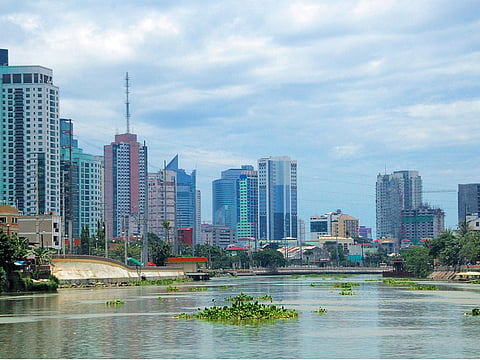Manila's Pasig River wins International River Prize
Rehabilitation efforts pay off to bring back to life the once-dying water artery

Manila: A key river in the Philippines has won the inaugural 2018 Asia Riverprize.
Once the object of criticism for being an eyesore, the Pasig River — Metro Manila and Laguna’s arterial waterway — has redeemed its reputation after years of rehabilitation.
The 27-kilometre-long Pasig River emerged winner over another finalist, China’s Yangtze River.
“The Riverprize is not a competition of which river is more beautiful or cleaner,” the award giving body, the International River Foundation (IRF) said.
Rehabilitation
“This is the reason why the IRF, comprised of river management experts and professionals from around the world, has given importance and consideration to the rehabilitation efforts of the Pasig River Rehabilitation Committee (PRRC) to bring back the Pasig River system to life.”
A view of Manila's Pasig River. The International River Foundation (IRF), comprised of river management experts and professionals from around the world, has recognised the job of the Pasig River Rehabilitation Committee (PRRC) to bring back the Pasig River system to life. IRF advocates the “integrated river basin management for the restoration, protection and sustainable management of the world’s rivers". Screengrab
The award was handed over on October 16, at the 21st International River Symposium held in Sydney Australia.
It was the first time that the prize was given by the IRF.
According to its website, the IRF advocates “integrated river basin management for the restoration, protection and sustainable management of the world’s rivers.”
A barge used in cleaning up and dredging silt from Pasig River in Manila. YouTube Screengrab
“Water is crucial for all life — and we need healthy rivers, lakes and wetlands for sustainable development. We promote and support effective management of these resources by facilitating knowledge sharing, education and best practice river basin management, and by recognising and rewarding those making a difference,” it said.
According to PRRC executive director, Jose Antonio E. Goitia, “the consecutive entries of the Pasig River as a finalist in the 2017 and Thiess International and Asia Riverprize, respectively, is a testament that the world recognises the efforts of the Philippine government to restore the Pasig River and its environs since PRRC was established in 1999.”
“Initially, the competition was called the Asia-Pacific Riverprize Awards which was opened to entrants from New Zealand, Australia, and 45 other countries.
"However, according to the IRF, due the to the high number and quality of entries received, they have made the decision to split the promoted Asia-Pacific Riverprize into two: Asia Riverprize and another category for the Australasia Riverprize,” Goitia said in a blog.
Due to the efforts of the present and past administrations, the once-dying Pasig River had sprung back to life and offers hope that it will regain the splendour it once had when it was the subject of prose and poetry from old times.
“Compared to the 1990s when it was declared ‘biologically dead,’ the Pasig River’s condition now has significantly improved. Although the Pasig River development is a work in progress, many areas along the historic river have already shown signs of aquatic life and it has already become conducive for transport, recreation, and tourism,” Goitia said.
Visitors check out the Pasig River. Thanks to the efforts of the present and past administrations, the once-dying Pasig River had sprung back to life and offers hope that it will regain the splendour it once had when it was the subject of prose and poetry from old times. Screengrab
The IRF, for its part, said: “Critical to the success of the story was bringing the community, around 18,000 people, to decent housing and transforming these communities and their lives into environmentally responsible citizens.”
Aside from global recognition, the winner of the 2018 Asia Riverprize can build new partnerships, provide opportunities for exchange of knowledge and best practices, and open doors for international support.
The winner will automatically qualify for Stage Two of the Thiess International Riverprize in 2019.


